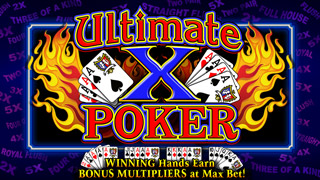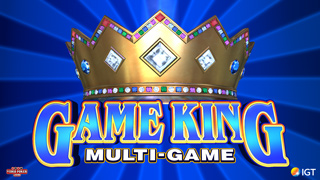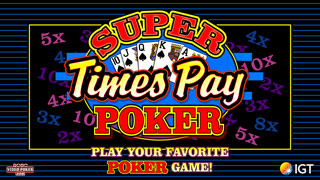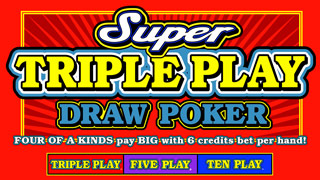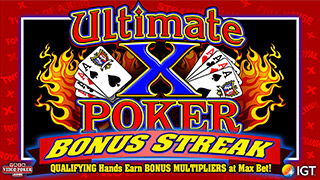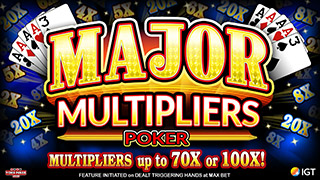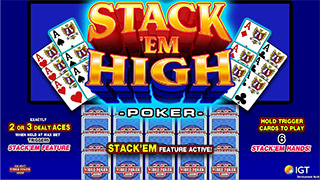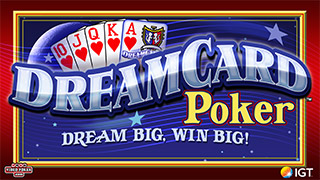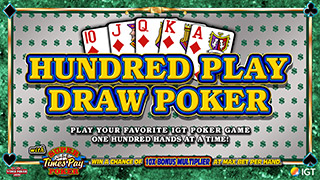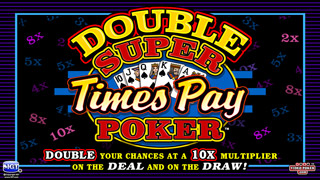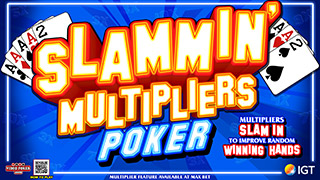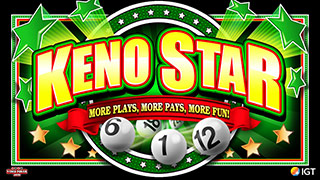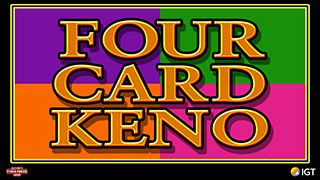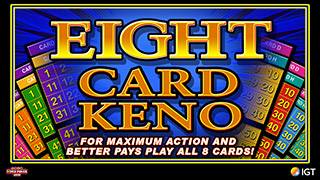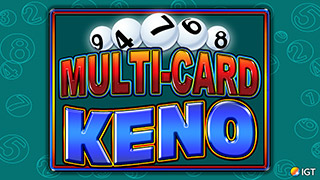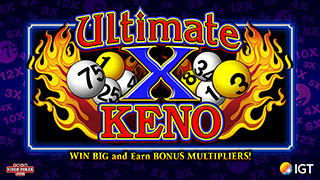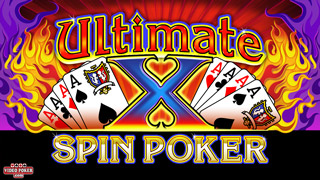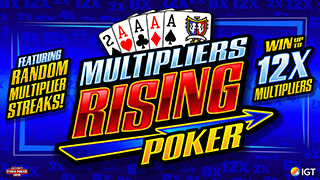random independant events
-
faygo
- Video Poker Master
- Posts: 2925
- Joined Forum: January 9, 2007
- View Player Page
Re: random independant events
pseudo randomness refers to the fact that there is a finite number of possible hands. Until you grasp that you will never under stand the game.
This is no different then live poker played with one deck of cards. The only difference is the size of the pot in the middle of the table or on the paytable.
Eduardo, pass the Brussel Sprouts.
This is no different then live poker played with one deck of cards. The only difference is the size of the pot in the middle of the table or on the paytable.
Eduardo, pass the Brussel Sprouts.
-
shadowman
- Video Poker Master
- Posts: 3587
- Joined Forum: October 23, 2006
- View Player Page
I am confused by the comments that the VP machines are not programmed to produce a specific return - based on perfect play. What does the “micro chip” that is placed in each VP machine do, if not store a program that will produce specific results over a period of hands?
pseudorandomness is an entirely deterministic casual process. This is from Wikipedia. What does this mean in plain English?
The specific results are determined by the paytable. We can compute just how often each possible result occurs from pure random chance. We can then assign a value to each of those results. For example, let's say a full house occurs randomly every 100 hands. That means it will return 1% for each increment of our bet. If we pay back 9 coins for the FH instead of 7 coins the return of the game will increase by 2%.
If we do the computations for all elements of the pay table we can compute the return of any game. In fact, this is exactly how pay tables are determined.
I agree that a hot cycle or a cold cycle is not predictive. But, what no one is responding to is the huge amount of people that can tell you that at the present, and most recent past, they are going through what looks like a cycle. And that these cycles occur with and without a RNG.
Well, if we're staying on topic and discussing VP machines then we know it is "with" a RNG.
“It cracks me up that if you walk up to someone in a casino and ask them how they are doing, they will answer, "I'm winning" or "I'm losing". To which I sometimes respond, "didn't you leave out the words, 'Have been'". It is actually impossible to mention any gambling result in the present or future tense. Yet people experience the past as something that's happening to them right now. It's an almost ubiquitous human cognitive distortion related to time perception.” I AM SURE THAT SOME PEOPLE SEE THIS AS A FACT. I AM NOT ONE OF THOSE PEOPLE. WHAT YOU ARE DOING IS TEARING APART A PERSON’S USE OF PRESENT TENSE OR PAST TENSE. FOCUS ON THE CYCLE, NOT THE INCORRECT TENSE, PLEASE.
I think I can understand how pseudo randomness is preferred to true randomness by the VP player as well as the casinos. In true randomness, the casinos could lose lots of money over a short period of time, depending on the random results.
There is no difference between pseudo-randomness and pure randomness from the casinos' or any ones viewpoint. It's just cheaper to build machines with a pRNG. That's why it is done, nothing more or nothing less.
A deviation of 1 sounds reasonable to me. If fact, I think a larger deviation would be reasonable, at certain points in a cycle. I would call this volatility. However, where I am having trouble accepting words as facts is that when the manufacture of a machine installs a chip at the factory, that chip is supposed to return a predetermined percent to the player, over the entire life of a cycle. If it returns a higher or lower amount, than the agreed upon amount, then I would call this deceptive. Unfair to the casino, or unfair to the players.
In other topics, there is a big deal made of a machine returning 9/6 vs 9/5. This is a 1 percent difference, roughly. So, it seems likely that it would be a big deal if the program of a machine were to return 1, 2, or 3 percent more / less than what the pay chart promised over the lifetime of the program’s cycle. Why do you think this is not a big deal?
A machine will almost always return much less than the theoretical ER. That is because that ER is based on optimal play and no one plays perfectly. Most people play far worse than optimally so it isn't unusual for a machine to pay 2-8% below the theoretical value. If you want to call that deceptive then you always have the choice of not playing. The fact is the theoretical return of VP machines is only as high as it is because of the poor play. If all people played perfectly they wouldn't install any machines better than 98%.
pseudorandomness is an entirely deterministic casual process. This is from Wikipedia. What does this mean in plain English?
The specific results are determined by the paytable. We can compute just how often each possible result occurs from pure random chance. We can then assign a value to each of those results. For example, let's say a full house occurs randomly every 100 hands. That means it will return 1% for each increment of our bet. If we pay back 9 coins for the FH instead of 7 coins the return of the game will increase by 2%.
If we do the computations for all elements of the pay table we can compute the return of any game. In fact, this is exactly how pay tables are determined.
I agree that a hot cycle or a cold cycle is not predictive. But, what no one is responding to is the huge amount of people that can tell you that at the present, and most recent past, they are going through what looks like a cycle. And that these cycles occur with and without a RNG.
Well, if we're staying on topic and discussing VP machines then we know it is "with" a RNG.
“It cracks me up that if you walk up to someone in a casino and ask them how they are doing, they will answer, "I'm winning" or "I'm losing". To which I sometimes respond, "didn't you leave out the words, 'Have been'". It is actually impossible to mention any gambling result in the present or future tense. Yet people experience the past as something that's happening to them right now. It's an almost ubiquitous human cognitive distortion related to time perception.” I AM SURE THAT SOME PEOPLE SEE THIS AS A FACT. I AM NOT ONE OF THOSE PEOPLE. WHAT YOU ARE DOING IS TEARING APART A PERSON’S USE OF PRESENT TENSE OR PAST TENSE. FOCUS ON THE CYCLE, NOT THE INCORRECT TENSE, PLEASE.
I think I can understand how pseudo randomness is preferred to true randomness by the VP player as well as the casinos. In true randomness, the casinos could lose lots of money over a short period of time, depending on the random results.
There is no difference between pseudo-randomness and pure randomness from the casinos' or any ones viewpoint. It's just cheaper to build machines with a pRNG. That's why it is done, nothing more or nothing less.
A deviation of 1 sounds reasonable to me. If fact, I think a larger deviation would be reasonable, at certain points in a cycle. I would call this volatility. However, where I am having trouble accepting words as facts is that when the manufacture of a machine installs a chip at the factory, that chip is supposed to return a predetermined percent to the player, over the entire life of a cycle. If it returns a higher or lower amount, than the agreed upon amount, then I would call this deceptive. Unfair to the casino, or unfair to the players.
In other topics, there is a big deal made of a machine returning 9/6 vs 9/5. This is a 1 percent difference, roughly. So, it seems likely that it would be a big deal if the program of a machine were to return 1, 2, or 3 percent more / less than what the pay chart promised over the lifetime of the program’s cycle. Why do you think this is not a big deal?
A machine will almost always return much less than the theoretical ER. That is because that ER is based on optimal play and no one plays perfectly. Most people play far worse than optimally so it isn't unusual for a machine to pay 2-8% below the theoretical value. If you want to call that deceptive then you always have the choice of not playing. The fact is the theoretical return of VP machines is only as high as it is because of the poor play. If all people played perfectly they wouldn't install any machines better than 98%.
-
onemoretry
- Video Poker Master
- Posts: 3133
- Joined Forum: March 3, 2009
- View Player Page
I am confused by the comments that the VP machines are not programmed to produce a specific return - based on perfect play. What does the “micro chip” that is placed in each VP machine do, if not store a program that will produce specific results over a period of hands?
As I stated previously, the programme ensures, to the highest degree possible, that each and every time a player chooses to draw a card or cards, each and every eligible card has an equal chance of being selected.
-
Frank Kneeland
- VP Veteran
- Posts: 762
- Joined Forum: February 2, 2011
- View Player Page
I am confused by the comments that the VP machines are not programmed to produce a specific return - based on perfect play. What does the “micro chip” that is placed in each VP machine do, if not store a program that will produce specific results over a period of hands?Give me a few and I'll clean up an excerpt from my book and post it. Perhaps this will help. The post will be entitled, "Pseudo-anti-random-disestablish-mentarianism". pseudorandomness is an entirely deterministic casual process. This is from Wikipedia. What does this mean in plain English?It means RNG's are programed to be random. The process that creates the random numbers is "entirely deterministic casual" as is the act of programing the algorithms, the results are unpredictable and equiprobable. It's kinda like DECIDING to do something completely SPONTANEOUS. You seem to be focusing on the process and not the result.I agree that a hot cycle or a cold cycle is not predictive. But, what no one is responding to is the huge amount of people that can tell you that at the present, and most recent past, they are going through what looks like a cycle. And that these cycles occur with and without a RNG.OK here's an experiment you can do at home. Get several decks of cards. Shuffle really well between deals and alternate decks between hands. Deal yourself 5 cards and play video style poker by yourself recording all the results. What you'll find is exactly the same "cycles" you believe you are seeing in video poker machines. Then ask yourself how the computer programmers managed to program the chips in the live playing cards???For that matter you can just ask yourself why dice in craps games (which have no computer chips or programming) run in streaks, or why flipped coins have streaks.Alternatively you can sample your VP hands differently, such as playing 1 hand on 100 machines instead of playing 100 hands on 1 machine. You can also play a large number of hands recording EVERY SINGLE HAND and then numbering them; then look at odd numbered hands, even numbered hands, every third hand, hands divisible by 5, etc...Again patterns of hot and cold streaks will appear, but now it will be more obvious to you that you are creating them by your sampling technique. Looking at the last 1000 hands you played on a single machine, in a single hour, doesn't feel like sampling, because the hands occurred in a row, but it is sampling none the less because independent random events have no row.FOCUS ON THE CYCLE, NOT THE INCORRECT TENSE, PLEASE.I'm attempting to do so.I think I can understand how pseudo randomness is preferred to true randomness by the VP player as well as the casinos. In true randomness, the casinos could lose lots of money over a short period of time, depending on the random results.How you got this from what I said is troubling. That's exactly opposite to what I was saying.1. Pseudo randomness is not merely preferred, it is the only thing a computer can create and the only possible option.2. If it were possible to generate truly random events the casinos and players would never notice the difference. RNG's are for all intents and purposes more random than true randomness. At least metaphorically, they are "more random" becasue true randomness is impossible for humans to master due in part to Heisenberg's Uncertainty Principle.(No cats were injured during the typing of the reply)A deviation of 1 sounds reasonable to me. If fact, I think a larger deviation would be reasonable, at certain points in a cycle. I would call this volatility. However, where I am having trouble accepting words as facts is that when the manufacture of a machine installs a chip at the factory, that chip is supposed to return a predetermined percent to the player, over the entire life of a cycle. If it returns a higher or lower amount, than the agreed upon amount, then I would call this deceptive. Unfair to the casino, or unfair to the players.I have had access to the drop results for several banks of progressive VP machines. The return for the casino over a four year period ranged between 92.5% and 107% on identical machines linked to a single meter on a single bank. Seemed pretty darned random to me.In other topics, there is a big deal made of a machine returning 9/6 vs 9/5. This is a 1 percent difference, roughly. So, it seems likely that it would be a big deal if the program of a machine were to return 1, 2, or 3 percent more / less than what the pay chart promised over the lifetime of the program’s cycle. Why do you think this is not a big deal?It is a big deal. It's just nothing the casino can do anything about legally.
-
Frank Kneeland
- VP Veteran
- Posts: 762
- Joined Forum: February 2, 2011
- View Player Page
The excerpt from my book,
"Pseudo-anti-random-disestablish-mentarianism"
is now posted.http://forum.videopoker.com/forum/forum ... =4356&PN=1
-
jim18
- Senior Member
- Posts: 118
- Joined Forum: March 4, 2011
- View Player Page
FrankThanks for taking the time to create a new topic and explain randomness in more detail.I will try to focus in on a couple of your points, to make this discussion more concise with what I find to be a little bit murky.“Equiprobable, means all the possible outcomes must be equally likely and occur with the same relative frequency”. In the above quote, what does relative frequency mean? And how can all the possible outcomes have equal likelihood of occurring ?As to patterns of hot and cold. While I really understand how you are looking at the events and seeing them not as a pattern, but completely random, I think for me, as well as most other gamblers, we will continue to see events that happen in a row as a pattern. But, thanks to you, I will now see these patterns as a series of independent events also.“I have had access to the drop results for several banks of progressive VP machines. The return for the casino over a four year period ranged between 92.5% and 107% on identical machines linked to a single meter on a single bank. Seemed pretty darned random to me.” I think this quote shows me that each machine is working independently of the other machines in the bank of machines.What this does not take into account is the accuracy of each player playing the various machines, which helped to cause the spread in the results.The spread in the results suggests to me that these machines do not return a fixed percent over time, taking player error out of the equation. I will accept your explanation that randomness does not produce the same results in the long run, because you have facts to back this up with.However, by reading some postings somewhere on this site I had it in my mind, that each machine was given a program to run, and that before it could start over, it had to complete this program. And that this program was designed to produce a specific result, which a player could anticipate by looking at the pay back schedule. Since this conclusion seems to be wrong, I will give it up, until someone else re-establishes it.I think the above misconception that I had about randomness will help you to see why I have been struggling with some of your statements.There is an emoticon representing cold cycles. Do you think this emoticon should be eliminated, as there is no such thing as a cold cycle?
-
Frank Kneeland
- VP Veteran
- Posts: 762
- Joined Forum: February 2, 2011
- View Player Page
“Equiprobable, means all the possible outcomes must be equally likely and occur with the same relative frequency”. In the above quote, what does relative frequency mean? And how can all the possible outcomes have equal likelihood of occurring ?It means that hands such as Royal Flush's will not occur with equal frequency to hands like 3 of a kind because there are more ways to make 3 of a kind. But the cards themselves have equal chances of coming up.As to patterns of hot and cold. While I really understand how you are looking at the events and seeing them not as a pattern, but completely random, I think for me, as well as most other gamblers, we will continue to see events that happen in a row as a pattern. But, thanks to you, I will now see these patterns as a series of independent events also.They are of course both. In the future they are random independent events. In the past we group them into patterns. It requires hindsight for patterns to emerge. That's the important thing to understand.“I have had access to the drop results for several banks of progressive VP machines. The return for the casino over a four year period ranged between 92.5% and 107% on identical machines linked to a single meter on a single bank. Seemed pretty darned random to me.” I think this quote shows me that each machine is working independently of the other machines in the bank of machines.Oh yea their only connection is the progressive JP.What this does not take into account is the accuracy of each player playing the various machines, which helped to cause the spread in the results.Good question. I typical always played the two right machines because they were faster and I only played when the progressive was up. This caused a massive disparity between quality and quantity of play. The pay tables were identical.The spread in the results suggests to me that these machines do not return a fixed percent over time, taking player error out of the equation. I will accept your explanation that randomness does not produce the same results in the long run, because you have facts to back this up with.I will tell you this. I was just as surprised to see the variance first hand and had a hard time believing just how much the machines differed in return given identical pay tables. It was a shocker to be sure. It did convince me that at least these machines were honest and random...a but too random if you ask me. Oh, the average of all the machines came to within .3% of expectation.However, by reading some postings somewhere on this site I had it in my mind, that each machine was given a program to run, and that before it could start over, it had to complete this program. And that this program was designed to produce a specific result, which a player could anticipate by looking at the pay back schedule. Since this conclusion seems to be wrong, I will give it up, until someone else re-establishes it.No as far as I know that it not the case at all. The RNG has no memory.I think the above misconception that I had about randomness will help you to see why I have been struggling with some of your statements.There is an emoticon representing cold cycles. Do you think this emoticon should be eliminated, as there is no such thing as a cold cycle?Na, let them have their bread and circuses.
-
WisT
- Forum Rookie
- Posts: 24
- Joined Forum: August 2, 2010
- View Player Page
Thank you all for the random number discussions.
Sometimes I try to choose [perhaps at a vending machine] at random using my mind. Here is my method. I think of a word that is sufficently long and then count the number of letters. If even, I choose A; if odd, I choose B. I try to prevent choosing the same words. I do this by going down the alphabet for long words or picking an uncommon word or phrase from my surroundings. I don't believe that I can immediately know if a word such as "amazement" "greenbaypackers" chicagotribune" has odd letters.
Do you know another mental method that does not use a coin or device?
How does one randomize between three choices? This choice eludes me even with a coin . . . .
Sometimes I try to choose [perhaps at a vending machine] at random using my mind. Here is my method. I think of a word that is sufficently long and then count the number of letters. If even, I choose A; if odd, I choose B. I try to prevent choosing the same words. I do this by going down the alphabet for long words or picking an uncommon word or phrase from my surroundings. I don't believe that I can immediately know if a word such as "amazement" "greenbaypackers" chicagotribune" has odd letters.
Do you know another mental method that does not use a coin or device?
How does one randomize between three choices? This choice eludes me even with a coin . . . .
-
Frank Kneeland
- VP Veteran
- Posts: 762
- Joined Forum: February 2, 2011
- View Player Page
Thank you all for the random number discussions.
Sometimes I try to choose [perhaps at a vending machine] at random using my mind. Here is my method. I think of a word that is sufficently long and then count the number of letters. If even, I choose A; if odd, I choose B. I try to prevent choosing the same words. I do this by going down the alphabet for long words or picking an uncommon word or phrase from my surroundings. I don't believe that I can immediately know if a word such as "amazement" "greenbaypackers" chicagotribune" has odd letters.
Do you know another mental method that does not use a coin or device?
How does one randomize between three choices? This choice eludes me even with a coin . . . .
I have never though about metal randomising techniques. (other than dating)As far as the 1-3, I use a six sided die.1-2 = 13-4 = 25-6 = 3~FK
-
New2vp
- Video Poker Master
- Posts: 1887
- Joined Forum: September 11, 2006
- View Player Page
Think of a date in history (or the future) that you have never used for randomization before. If you want to thrown in a clock time as well, that would be ok, but it would just make the calculation longer. Add the numbers together again and again until you get one digit. Divide by 3 and take the remainder. The remainder will be 1, 2, or a zero (we will assign the 0 to 3).For example July 4, 1776. Change the month to a year and just add the digits, and keep re-adding until you get down to a single digit.7 + 4 + 1 + 7 + 7 + 6 = 323 + 2 = 5Divide the last digit by 3 and use the remainder as your random number.5 / 3 = 1 remainder 2.The random choice associated with this date is 2 (out of 3). If you had selected a time as well, the choice might have been different.And if you make a mistake in adding, it doesn't matter so long as the mistake is random and you don't make systematic mistakes because you don't know a specific sum.Edit: You could also use your letter counting method with long words, divide by 3 and use the remainder. That really corresponds exactly to what you are doing when you are determining whether you have an odd or even number of letters to choose between 2 alternatives. Again, you can't choose the same word twice, unless you want to bias the result for some reason.



